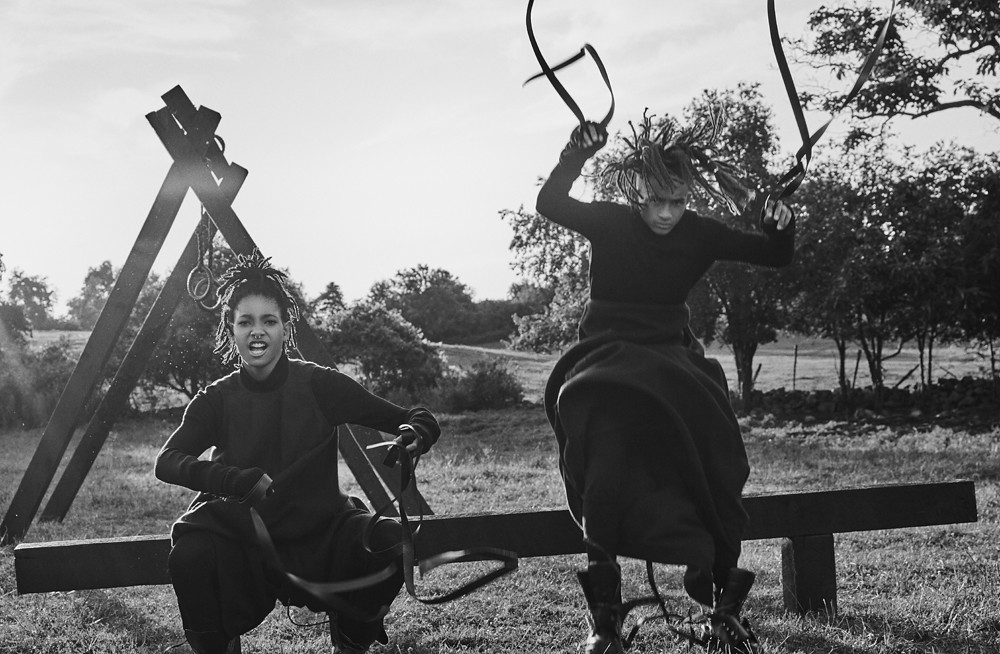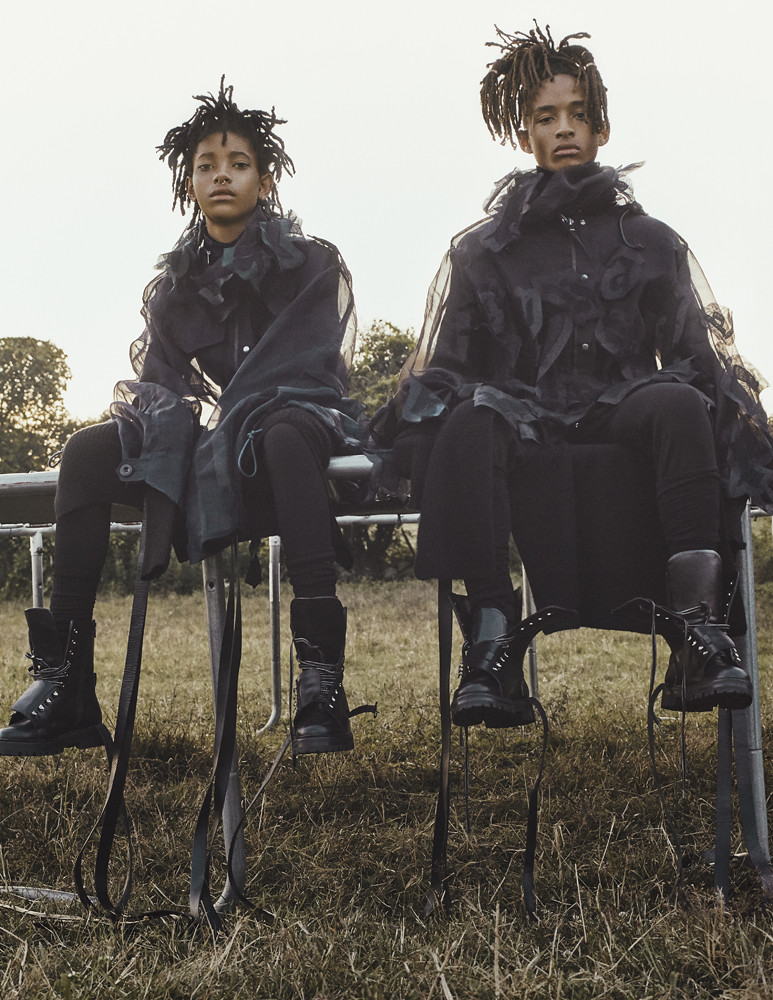PHARRELL WILLIAMS: So, what's up, guys? What's on your mind, Willow?
WILLOW SMITH: This morning actually was pretty intense because I was thinking about the world and my place in the world, things that I have made or want to make. I was thinking about all the things that I could do that I don't do. But, you know, I was just thinking about the world and everything.
PHARRELL: Well, you guys are the future. There's an older generation that feels like they know what the future should be. And then there's your generation that may have an idea of what the future should be, but that could evolve. How old are you now?
WILLOW: I'm 15.
JADEN SMITH: I actually just turned 18 last Friday.
PHARRELL: Happy belated!
JADEN: Thank you.
PHARRELL: Do you guys ever feel any generational divide when you have a conversation with older folks?
WILLOW: Oh, definitely. It seems like they don't understand our thought process. Or, like, things have happened in the past that they're still mad about. We want to accept them and move forward. I mean, I can definitely see things that have happened in the past that they're holding on to and things that are happening right now that bog them down, but this generation wants to transcend them.
PHARRELL: It would be cool if they would remember when they were teenagers what the generational divide was then. Except that the generational divide is much more blunt at this time. You guys grew up online. Part of your life is on social media. And when they look at it as just something to do, they don't realize that they also essentially live online. They don't realize that their phone has replaced their wallet.
WILLOW: Yep. I know so many kids who literally are, like, Instagram-famous. They have done nothing but post pictures on Instagram. And they have followings. People love to see them in person, but it's only because they post on their Instagram. It's literally crazy. Kids will paint a picture of themselves that is so far beyond who they actually are. It's like they're wearing someone else's skin.
PHARRELL: I love that there are pros and cons to all of it. I feel like your generation understands that. Some of them abuse it. And some just purely use it.
WILLOW: And then there's people, like me and Jaden, who want to utilize social media to elevate the consciousness of those people who feel like all they want from social media is to be famous. [laughs] Like, you can actually be a voice. You can actually say something that's inspiring and not just make people feel like you need to buy things and be a certain way.
JADEN: It's good to be happy and tell us how cool your life is and how awesome you are on social media. That's great because it inspires other people to be happy, too. But a lot of times, people are trying to be happy in the wrong ways—with money or with different things that are not true happiness. It's leading people down a rabbit hole that actually doesn't exist. So people think like, "Yo, once I get this money and these cars and stuff, I'ma be so happy." But that's not true. And I feel like that's why it's very important to educate people on different things while you are actually on social media.
PHARRELL: I love it. The positive path and the trajectory that you guys are on, where does that come from? Who are your biggest inspirations?
WILLOW: My parents. Growing up, all I saw was my parents trying to be the best people they could be, and people coming to them for wisdom, coming to them for guidance, and them not putting themselves on a pedestal, but literally being face-to-face with these people and saying, "I'm no better than you, but the fact that you're coming to me to reach some sort of enlightenment or to shine a light on something, that makes me feel love and gratitude for you." They always give back what people give to them. And sometimes they keep giving and giving and giving. And some people don't feel like they need to give anything back because it's like, "Oh, if you're famous, you can just keep giving, and it doesn't matter." It's not just about money. It's not just about giving people gifts or whatever. What my parents have given to me is not anything that has to do with money or success or anything that society says people should be focusing on—it's something spiritual that only certain people can grasp and accept. And that's how I act and move in the world today.
JADEN: I 100 percent agree with Willow on that one. My parents are definitely my biggest role models. And that's where me and Willow both pull all of our inspiration from to change the world. It all comes from a concept of affecting the world in a positive way and leaving it better than it was than when we came. I feel like that enters into all types of different areas because there are so many different outlets that life has to offer for us. That goes into technology, into music. That goes into science, into spirituality, into education. Where me and Willow come from, a lot of it is trying to make society more efficient, so that kids don't cry, like, "Why do I have to go to school?" Instead, kids are like, "Yeah! I'm so glad to go to school! I'm a better person than I was yesterday, and I can help people."
WILLOW: Exactly!
JADEN: That's we're trying to get to. Where every kid goes to school, and like 50 percent of children don't drop out. Where they feel like their teachers are actually on their side. Or they feel like law enforcement is actually on their side. We want to create a society that is working for us and with us—and we're working for society, not against it.
PHARRELL: It's beautiful that you guys are in such lockstep. Willow, you once said that you felt like the two of you were almost like identical twins, like you could finish each other's thoughts. Were you guys always that close?
WILLOW: Yeah. It's crazy, the sibling dynamic. I could've spent my entire childhood like, "I have to love this person." And it becomes a chore. But our parents were never like, "You have to love them." It was more like, "You have your life. He has his life. And when you guys want to come together, when you guys want to commune, that's up to you." And throughout us realizing ourselves and realizing each other, we just opened our eyes and were like, "Damn, you are the yin to my yang." Not a lot of siblings have that opportunity, because they're always being pushed together so much. They need their time apart in order to realize themselves and realize who they are.
PHARRELL: Has there ever been, like, some love-based competition?
JADEN: We never really felt competitive because Willow's always been better than me at everything. There's been no competition.
WILLOW: [laughs] Pharrell, that is so not true.
JADEN: Willow started making music first. I was like, "My younger sister is, like, 4, and she's making all these fire songs. What's happening?" Willow was doing all these things, about to have record label deals at like the age of 6, and I was like, "I feel like I'm underachieving." That was around the time that I was doing Karate Kid, and I could do flips, and I thought I was special because I could do flips. But Willow could do the flips, too! Willow naturally had it. Like, I was trying to do no-handed cartwheels. Willow had it. I was trying to get to the studio. Willow was in the studio. You know what I'm saying? Willow just didn't have as big as a passion for acting as me. But if she did, she could do what I did. So there's always been competition, but we've always worked as hard as possible to do the things that we want to do. We never got upset because we could always do the same thing. It happened so that me and Willow were able to go through every level or different section of life that we wanted to. If we wanted to act, we could act. If we wanted to dance, we were dancing. And we could do it on the level that we wanted to do it. So there was no, like, "I'm mad at you." Well, we would get mad at each other when we were young, but that stopped when we were, like, 9.











